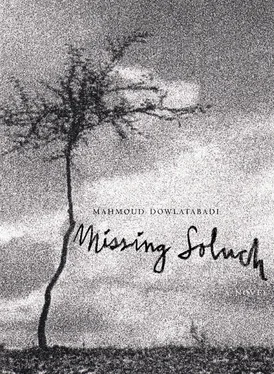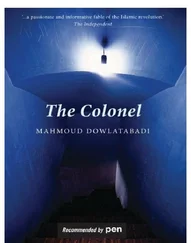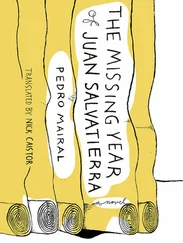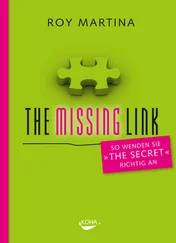Molla Aman pulled the Sardar to the edge of a canal, and the Sardar looked at its moist bed. There was only a thin stream of water trickling down the center. The Sardar pounded his stick into the half-dead stream, making a hole in the bed as deep as a fist-sized rock. By the time Mergan caught up, the two men set out again in a hurry.
* * *
Small groups of men were standing or sitting in the center of the canal system. It was something like a mourning ceremony. Most of them were the poor villagers who had small stakes in the canal waters. Hassan Yavar, who had a larger claim than the others, and who had made the complaint against the water pump owners to the governor’s office, was not among them. He was likely with the officials at the water pump itself.
As the Sardar arrived, the men rose and encircled him. Ghanbar Shadyakh, the father of Halimeh, pounded his shovel before the feet of the Sardar and said, “May God take account of you if you don’t testify to say that the water of the canals was already low before your camel fell into this well!”
Hamdullah Kanaan, a stout short-tempered man, dug his claw into the Sardar’s shoulder, saying, “These are some right bastards, Sardar! We had to deal with a hundred obstacles before we managed to get the officer and the inspector to come out here, and then today they’ve blocked the canal water like this! They took your poor defenseless camel and threw her into the main canal well just to claim to the auditor that the low water level of the canals isn’t caused by the water pump!”
The Molla of Zaminej, who was standing there, was muttering, “Judgment Day! Judgment Day!”
Ali Yavar, not addressing anyone in particular, said, “The fields are baking from the lack of water! Baking! If our fields don’t have water in a day or two, the next harvest will be destroyed!”
Molla Aman and the Sardar walked the path up to the well, with the others following behind them. Ghanbar Shadyakh was holding his shovel on his shoulder as he ran between the people, saying over and over, “God will take account, Sardar. He’ll take account if you don’t testify about the water!”
Hamdullah also kept murmuring his own curses. “These are a bunch of bastards all right! Real bastards!”
Morad approached the Sardar and Molla Aman.
“Here they come, Sardar! Zabihollah’s brought the inspector to look at the main well. He’s telling them why the water’s backed up. The Kadkhoda’s also written up an affidavit and is having it witnessed. He’s over there. It seems he’s taking their side on this.”
Molla Aman said, “But the traitor has a stake in this canal himself!”
Morad said, “The poor son of Sadegh Jal is sitting by the well and crying.”
A group was standing around the well. There were tire tracks from the Jeep imprinted in the dirt. Standing on the running board of the parked automobile was the driver, a broad-shouldered young man with tight curly hair who was the only person standing apart from the circle surrounding the well. Two policemen were walking back and forth next to the crowd. Three other strangers, the inspectors and officials from the Office of Agriculture, were standing apart from the others and were speaking among themselves. Salar Abdullah was standing by the group of officials. The son of Sadegh Jal was sitting by the edge of the well with his face hidden in his hands. Zabihollah was pacing to and fro with a nervous look on his face. Kadkhoda Norouz was standing behind the group of officials holding a sheet of paper in his hand. Hajj Salem and Moslem were milling about the group of people. Ali Genav was sitting to one side smoking a cigarette. The various smaller investors in the water pump were standing around with no obvious purpose, every bit as worried as the major investors who were all there.
Morad went straight up to the head officer and pointed out the Sardar.
The Sardar pushed aside the crowd and stepped up to the edge of the well. He looked into the well and heard the weak whine of his camel emerge from the bottom of the well. He knelt over and leaned farther into the well, calling out in a broken voice, “My poor animal! My poor animal!”
When he pulled his head from the well, his big eyes were full of tears. He looked around himself. Zabihollah was standing near him, looking askance toward him. The Sardar stood up, turned around, and parted the crowd as he made a beeline toward Zabihollah. Before he could duck into the crowd for cover, Zabihollah found himself face-to-face with the Sardar. Mergan gasped and the Sardar’s walking stick went up. Zabihollah jumped and began to run, heading toward the open field. The Sardar pursued him. Zabihollah, unarmed as he was, kept running. He was younger and had strong legs. The Sardar was already tired by his walk from the village. But he was more surefooted on the terrain. With two leaps, he managed to catch up with his prey. Desperate, Zabihollah grabbed a rock in his hand. But it was too late. With one blow by the stick to his leg, he fell, holding onto his leg with both hands. His forehead was crumpled and his eyes were shut. The worst pain always comes in the first blow. So the next few blows that the Sardar inflicted before some of those in the crowd managed to separate them did not add much to the pain that the first blow had already sent coursing through his body.
The police took custody of the Sardar from the crowd, and Mergan sat beside Zabihollah. The Sardar tossed his walking stick to one side as he approached the Jeep, getting into it. One officer remained with him, and the other came over to Zabihollah to take him away. The men picked up Zabihollah and carried him to the car. One officer sat between the men. There was fire in the Sardar’s eyes, while Zabihollah’s face was chalk white.
“Why’d you hit me, man?”
“Why’d you throw my camel in the well?”
“Me? No! No! Not me! I had come to cover the well, when … Oh … People! Come help me!”
The Sardar had tried to jump from the car, but the rifle of one of the officers was against his chest in a flash.
“Sit down. Where do you think you’re going?”
The other officials also got into the Jeep and the automobile set off.
Zabihollah asked painfully, “So, sir, what happened? What have you decided?”
One inspector replied, “You’ll need to change the position of the water pump!”
“What?!”
The Sardar’s camels were scattered around the field and he could see each of them, whether close or far, from the Jeep’s windows as it drove off. Two of his camels were standing near the drain for the water pump, and Karbalai Doshanbeh was standing by one of the animals, watching it drink from the water. The Jeep stopped beside the pump, and one of the inspectors and one of the policemen got out, walked over the pump, and shut the machine off. A moment later, as Karbalai Doshanbeh watched them in shock, they reentered the Jeep.
“We’ve signed and sealed it!”
Karbalai Doshanbeh walked a few steps toward the Jeep and then stood aghast in the dust that rose from the wheels as it drove off.
The two camels had stopped their drinking of the water and were looking at him. He turned and faced the animals, then sat by the pump drain grumbling.
“Imagine that I was planning to be the caretaker of the pump! Isn’t it a shame? Isn’t this clear water a shame? It was pure enough for your ablutions! Why did they shut it down? Working here saved me from that hovel, that shed! I spit on this life and the next!”
“Get up, Papa! Get up. They’re ruining our means of living!”
It was Salar Abdullah who had reached the water pump along with the crowd of partners and shareholders in the machine.
“Get up, Papa! Our property’s gone and turned to smoke!”
Читать дальше












